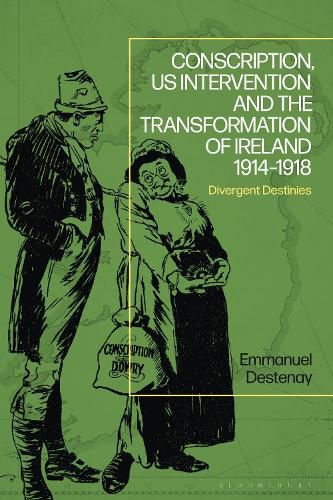Readings Newsletter
Become a Readings Member to make your shopping experience even easier.
Sign in or sign up for free!
You’re not far away from qualifying for FREE standard shipping within Australia
You’ve qualified for FREE standard shipping within Australia
The cart is loading…






This book analyses the relationship between the Irish home rule crisis, the Easter Rising of 1916 and the conscription crisis of 1918, providing a broad and comparative study of war and revolution in Ireland at the beginning of the Twentieth Century.
Destenay skilfully looks at international and diplomatic perspectives, as well as social and cultural history, to demonstrate how American and British, foreign and domestic policies either thwarted or fed, directly or indirectly, the Irish Revolution. He readdresses-and at times redresses-the well- established, but somewhat inaccurate, conclusion that Easter Week 1916 was the major factor in radicalizing nationalist Ireland. This book provides a more nuanced and gradualist account of a transfer of allegiance: how fears of conscription aroused the bitterness and mistrust of civilian populations from August 1914 onwards.
By re-situating the Irish Revolution in a global history of empire and anti-colonialism, this book contributes new evidence and new concepts. Destenay convincingly argues that the fears of conscription have been neglected by Irish historiography and this book offers a fresh appraisal of this important period of history.
$9.00 standard shipping within Australia
FREE standard shipping within Australia for orders over $100.00
Express & International shipping calculated at checkout
This book analyses the relationship between the Irish home rule crisis, the Easter Rising of 1916 and the conscription crisis of 1918, providing a broad and comparative study of war and revolution in Ireland at the beginning of the Twentieth Century.
Destenay skilfully looks at international and diplomatic perspectives, as well as social and cultural history, to demonstrate how American and British, foreign and domestic policies either thwarted or fed, directly or indirectly, the Irish Revolution. He readdresses-and at times redresses-the well- established, but somewhat inaccurate, conclusion that Easter Week 1916 was the major factor in radicalizing nationalist Ireland. This book provides a more nuanced and gradualist account of a transfer of allegiance: how fears of conscription aroused the bitterness and mistrust of civilian populations from August 1914 onwards.
By re-situating the Irish Revolution in a global history of empire and anti-colonialism, this book contributes new evidence and new concepts. Destenay convincingly argues that the fears of conscription have been neglected by Irish historiography and this book offers a fresh appraisal of this important period of history.